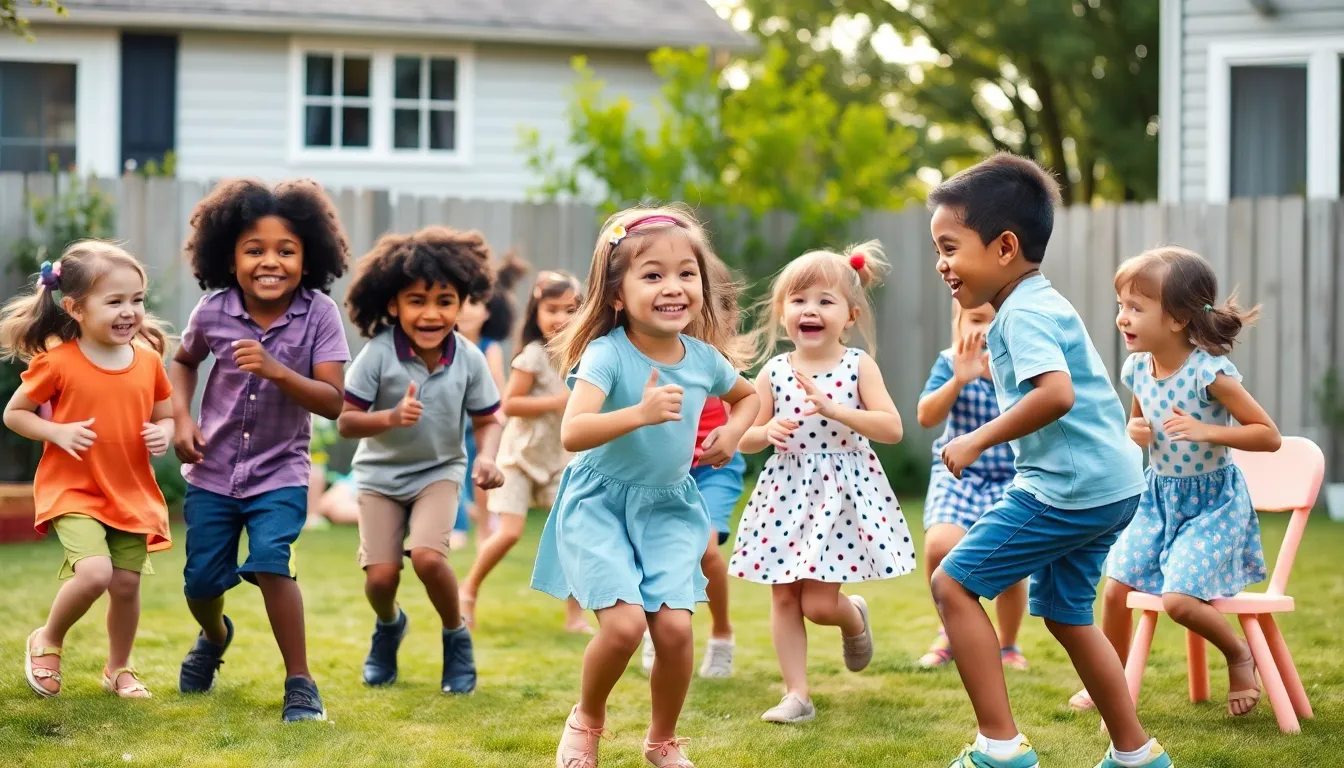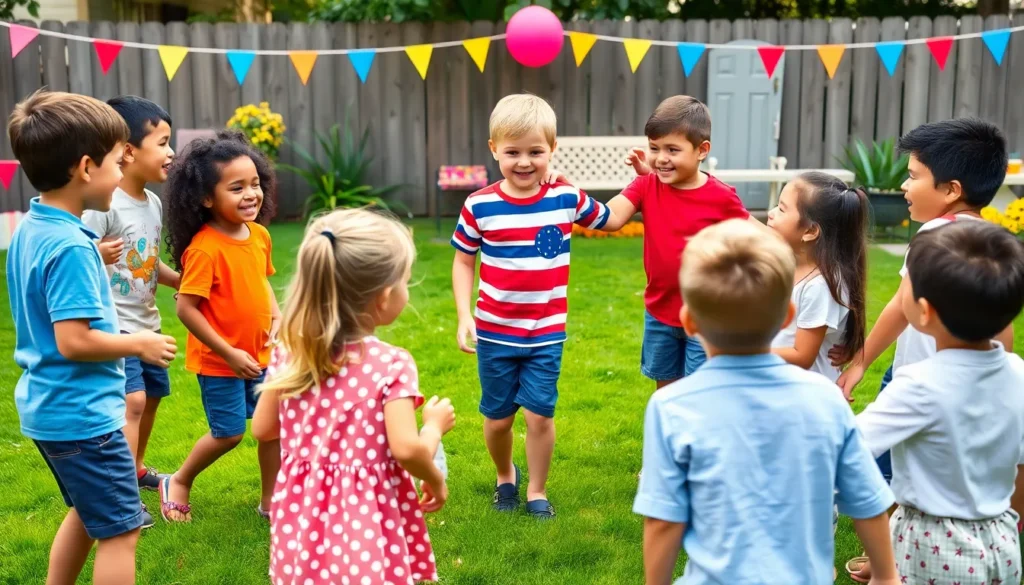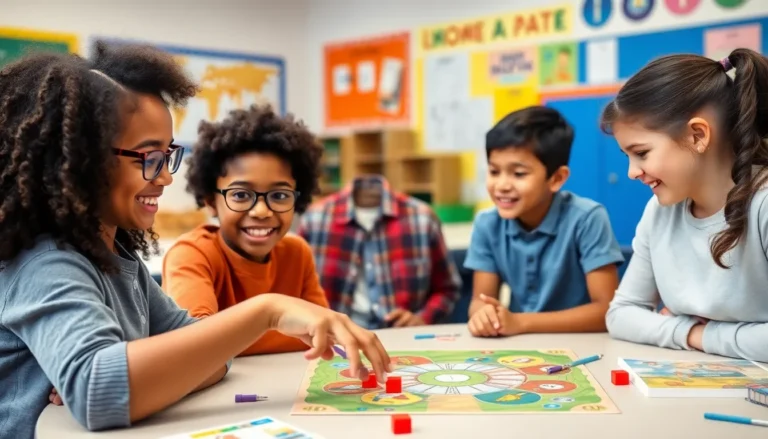Planning a party can feel like herding cats, especially when it comes to choosing games that everyone can enjoy. From toddlers to teens, finding age-appropriate party games is like trying to find a needle in a haystack—or maybe a party hat in a sea of balloons. But don’t worry, there’s a treasure trove of fun waiting just around the corner!
Table of Contents
ToggleOverview Of Age-Appropriate Party Games
Selecting party games for various age groups poses unique challenges. Multiple factors influence the choice, including physical abilities, interests, and social interactions. Engaging games for toddlers typically focus on simple movement and group participation. Examples like “Duck, Duck, Goose” or “Musical Chairs” foster fun and socialization at this young age.
Games for preschoolers shift slightly in complexity. Activities such as “Simon Says” and scavenger hunts promote listening skills and creativity. These games enhance cognitive development while ensuring maximum enjoyment.
For children aged 5 to 8 years, physical activity continues to be crucial. “Relay Races” and “Treasure Hunts” tap into their competitive spirit, encouraging teamwork and collaboration. These games adapt easily for indoor or outdoor settings, accommodating special requirements for space.
Tween and teen gatherings need more engaging and strategic options. They often enjoy games that involve creativity and challenge, such as “Capture the Flag” or escape room-style activities. Implementing technology, such as mobile trivia games, can also attract their attention.
A well-rounded party includes diverse games that cater to different age groups. Balancing physical, intellectual, and social activities ensures everyone engages in fun while feeling included. Coordinating a mix of games can keep the energy alive throughout the event. By recognizing the specific needs of each age group, hosts maximize entertainment and enjoyment.
Benefits Of Age-Appropriate Party Games

Age-appropriate party games provide numerous benefits for participants across different age groups. These activities promote essential skills that contribute to overall development.
Social Skills Development
Playing age-appropriate games fosters social skills in children. Interacting with peers encourages communication and cooperation, crucial for building friendships. Activities like “Musical Chairs” teach turn-taking, while games such as “Simon Says” cultivate listening abilities. As kids engage in group games, they learn to express themselves and respect others’ viewpoints. Inclusion in these playful environments helps enhance empathy and emotional intelligence. Ultimately, these experiences promote a sense of belonging and teamwork among participants of all ages.
Physical Activity
Engaging in age-appropriate games spots emphasis on physical activity and fitness. Activities like “Relay Races” maintain energy levels while improving motor skills. Participating in movement-based games aids in developing coordination and balance, vital for physical growth. Toddlers may enjoy simple games that enhance movement, while older children benefit from competitive challenges such as “Capture the Flag.” Keeping children active during a party contributes to healthier lifestyles and fosters a more dynamic atmosphere. Overall, these games integrate fun and fitness, ensuring participants remain engaged and active.
Popular Age-Appropriate Party Games By Age Group
Selecting games that fit various age groups creates an entertaining and inclusive atmosphere. Here’s a look at popular games tailored to specific age ranges.
Toddler Games
Toddler games emphasize movement and simplicity. “Duck, Duck, Goose” offers a fun way for toddlers to engage with one another. “Musical Chairs” also captivates their attention, combining music and quick reactions. “Freeze Dance” encourages toddlers to move and freeze, making it a lively choice. Each game promotes social interaction and helps develop motor skills.
Preschool Games
Preschool games introduce slightly more structure while remaining playful. “Simon Says” enhances listening skills and encourages imaginative play. Scavenger hunts can be adapted for indoor or outdoor settings, fostering exploration and teamwork. “Follow the Leader” adds dynamic movement that captivates young children. These activities support cognitive development and creativity through engaging tasks.
Elementary School Games
Elementary school games build on physical activity and teamwork. “Relay Races” encourage cooperation and friendly competition among participants. “Treasure Hunts” stimulate problem-solving and critical thinking in a fun environment. “Capture the Flag” promotes strategy and collaboration, making it ideal for outdoor gatherings. These games offer kids opportunities to develop social skills while staying active.
Teen Games
Teen games require a mix of engagement and strategy. Mobile trivia games appeal to their interests and foster friendly rivalry. “Capture the Flag” remains popular, as it encourages teamwork and strategy. “Karaoke” provides an entertaining way for teens to express themselves. These games focus on social interaction and creativity, ensuring an exciting party atmosphere.
Tips For Choosing Age-Appropriate Party Games
Selecting age-appropriate party games ensures enjoyable experiences for all participants. The right choices enhance engagement and learning.
Consider The Age Of Participants
Evaluate the specific ages of attendees before choosing games. Toddlers thrive in simple activities like “Duck, Duck, Goose.” For preschoolers, games such as “Simon Says” boost listening skills and creativity. Children aged 5 to 8 enjoy more active challenges like “Treasure Hunts.” Tweens and teens prefer strategic options like trivia or karaoke. Tailoring activities to match developmental stages promotes participation while fostering essential social skills.
Group Size And Dynamics
Account for the size of the group when selecting games. Smaller groups may benefit from more interactive activities, encouraging communication and collaboration. Larger gatherings lend themselves to team-based games, enhancing teamwork and competition. Consider energy levels and interests as well. Engaging games that spark excitement keep the atmosphere lively. By aligning game choices with group dynamics, hosts create memorable experiences and maintain participant engagement.
Selecting age-appropriate party games can truly elevate any gathering. By understanding the unique needs of different age groups hosts can create an engaging atmosphere that encourages interaction and fun. Whether it’s toddlers enjoying simple movement games or teens diving into strategic challenges there’s something for everyone.
The right games not only entertain but also promote essential skills like teamwork communication and physical activity. With thoughtful planning and consideration of the participants’ ages and dynamics hosts can ensure their parties are memorable and enjoyable for all. Embracing this approach turns any event into a vibrant celebration filled with laughter and connection.



